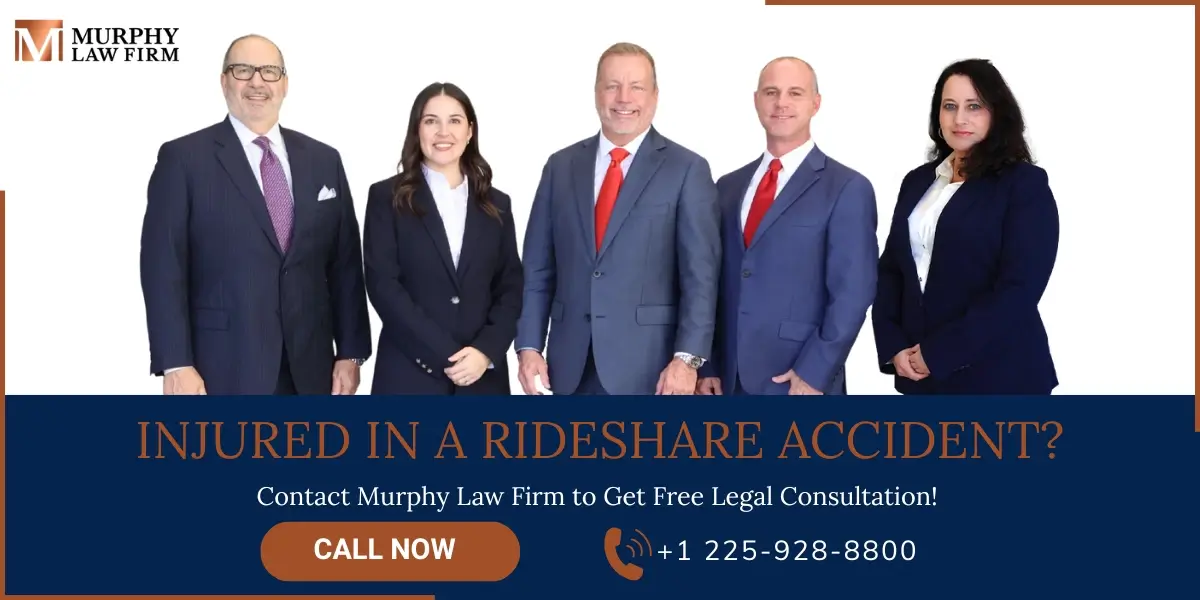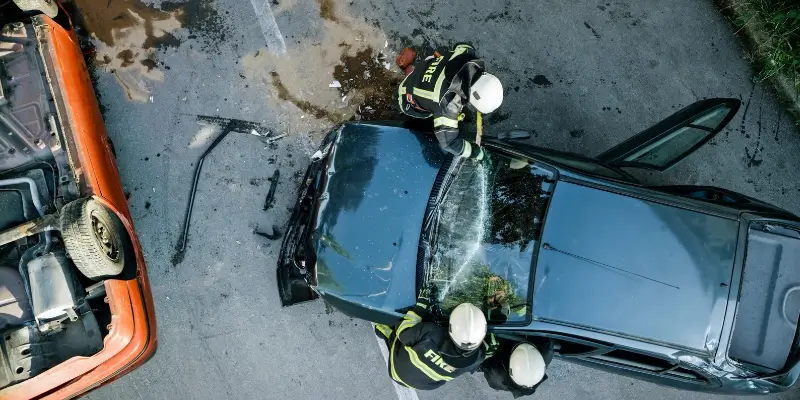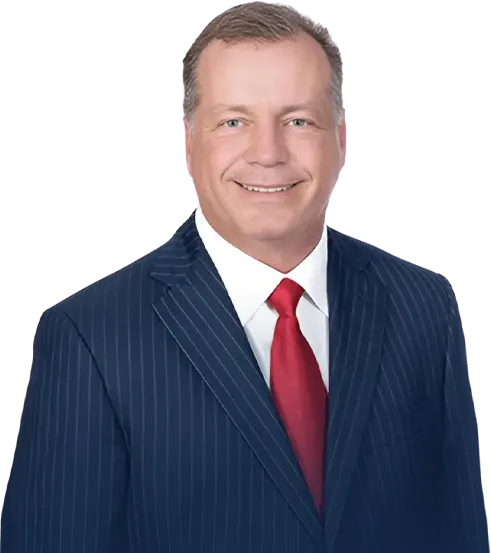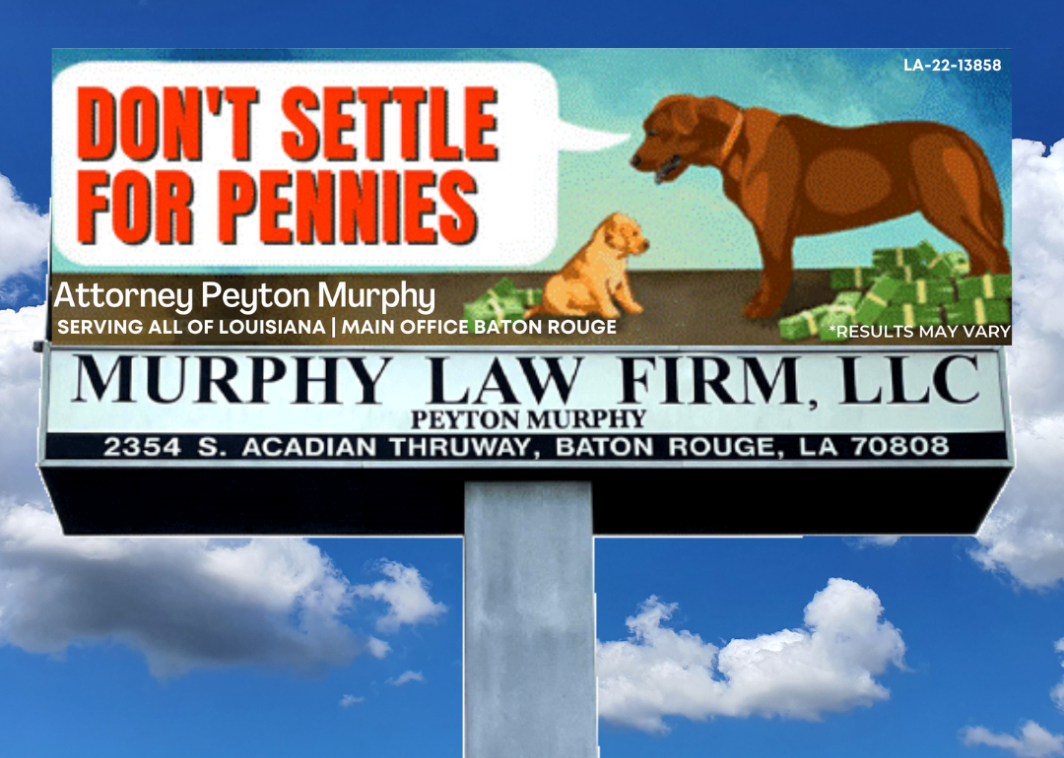Baton Rouge Rideshare Accident Lawyer
Baton Rouge, LA Rideshare Accident Lawyer
Key Takeaways
- Rideshare accidents in Baton Rouge may involve Uber or Lyft drivers and can cause serious injuries to passengers, drivers, or pedestrians.
- Liability in a rideshare accident depends on whether the driver was logged into the app, waiting for a ride, or transporting a passenger.
- Multiple parties may be responsible for a rideshare crash, including the rideshare driver or another negligent motorist.
- Victims should seek medical attention and document the accident to help support a claim.
- Compensation may include medical expenses, lost income, pain and suffering, and other accident-related losses.
- A Baton Rouge rideshare accident lawyer can help determine coverage, handle insurance claims, and pursue fair compensation.
Lyft and Uber drivers have been at the center of dozens of accident reports as victims and at-fault parties. If you’ve been involved in an accident as a rideshare passenger, rideshare driver, or other party in a crash with a rideshare vehicle, you need a Baton Rouge rideshare accident lawyer to help you navigate these complex claims.
Free Consultation
We Will Come To You
Proudly Serving the state of Louisiana for nearly 30 years
Fields Marked With An “*” Are Required

Baton Rouge, LA, Rideshare Accident Lawyer
If you’ve been in a car accident involving a ridesharing service in Louisiana, don’t hesitate to seek help at Murphy Law Firm. Our team of skilled Lyft and Uber accident lawyers provides guidance and support to anyone affected by the incident, whether you are a Lyft or Uber driver, passenger, another vehicle’s driver, bicyclist, or pedestrian. We have over 30 years of experience serving Louisiana and have secured over $250 million for our clients.
Are Uber or Lyft Cars Registered as Commercial Vehicles?
No, drivers participating in rideshare apps do not have to register or insure their cars as commercial vehicles. Even though they provide taxi-like services that enable passengers to arrange rides on short notice using a smartphone app, they are exempt from following the same guidelines and regulations. However, there are still requirements for what vehicles can be used for these services.
The two companies argue that taxi drivers typically spend around 70,000 miles annually on the road, whereas most Uber and Lyft drivers are part-time, so their cars are used much less.
Recently, it has been reported that more rideshare drivers are now full-time, placing them on the road equally as much as taxi drivers. Recently, bills have been signed into law regulating how app-based companies like Uber and Lyft operate and are insured.
- A rideshare driver needs primary automobile insurance that recognizes the driver as a Transportation Network Company (TNC) driver who uses the automobile for commercial purposes, or the company carries this insurance on the driver’s behalf.
- The required coverage amount when a driver is transporting a customer is at least $1 million in death and primary automobile liability insurance, which meets the minimum requirements of a limousine driver.

Are Lyft and Uber Drivers Screened in Baton Rouge?
Uber and Lyft drivers are screened for things like a safe driving record and serious criminal charges. The requirements are name, date of birth, Social Security number, driver’s license number, and a copy of their driver’s license. Contact us today to schedule a free consultation and to learn more about the legal process.
Steps to Take After a Ridesharing Accident
From 2020 to 2022, Lyft reported 111 motor vehicle fatalities, while Uber reported 153 motor vehicle fatalities in 2021 and 2022. After any type of car crash, always take care of your personal health and safety first. The right steps after a crash depend on how you were involved:
If you are a passenger:
- Make sure your Lyft driver stops and remains at the scene until it’s okay to leave.
- Get out of the roadway (or ask your Lyft driver to) and get to a safe place.
- Assess yourself for injuries first, and then check the Lyft driver and other parties involved for injuries.
- Call the police if anyone is hurt or killed, or if there is property damage in excess of $500, or any property damage to be safe.
- Remain calm and wait for authorities to arrive.
- Talk to the police, giving your side of the story and sticking to facts. The police should gather information such as the Lyft driver’s name, description of the vehicle, location of the crash, and the names of any eyewitnesses.
If you are a driver:
- Get out of the roadway and get to a safe place.
- Assess yourself for injuries first, and then check the Lyft passenger(s) and other parties involved for injuries.
- Call the police if anyone is hurt or killed, or if there is property damage in excess of $500.
- Remain calm and wait for authorities to arrive.
- Talk to the police, giving your side of the story and sticking to facts. The police should gather information such as your name, the Lyft passenger name(s), the vehicle’s description, the location of the crash, and the names of any eyewitnesses.
Lyft’s insurance company adjusters should contact you within a few days of filing your report. Lyft maintains a $1 million insurance policy to cover passenger damages. The company’s insurance will only pay for your damages if you were logged into the driver app at the time.
You will be eligible for different levels of coverage depending on what phase of the ride you were on. If you need help negotiating with Lyft’s insurance company, get in touch with our Louisiana rideshare accident lawyers.
Our Baton Rouge Car Accident Lawyer Can Help
Uber and Lyft accidents can quickly escalate into complex legal matters. Lyft or Uber may deny your claim because the company alleges your fault for the car crash or for some other reason that doesn’t fit your situation. Lyft’s insurance might not cover all of your damages. An at-fault third party could present the opportunity to sue for damages.
The right way to sort through all your potential options for financial recovery is with help from reputable Baton Rouge Lyft and Uber accident lawyers.
Murphy Law Firm has years of experience handling all types of car accident claims. Since the advent of Lyft, Uber, Sidecar, and other rideshare services, we’ve been quick to offer our personal injury experience and knowledge to rideshare accident victims throughout Louisiana.
We aren’t afraid to go up against Lyft’s insurance company, private insurers, product manufacturers, and other parties in pursuit of fair compensation. Get more information about your recent Lyft accident during a free case evaluation with our experienced car accident lawyers.
Louisiana’s “No Pay, No Play” Rule
A.
- There shall be no recovery for the first $100,000 of bodily injury and no recovery for the first $100,000 of property damage based on any cause or right of action arising out of a motor vehicle accident, for such injury or damages occasioned by an owner or operator of a motor vehicle involved in such accident who fails to own or maintain compulsory motor vehicle liability security.
- For purposes of this Section, the meaning of “bodily injury” and “property damage” is governed by the applicable motor vehicle liability insurance policy or, in the event of security other than an insurance policy, the meaning of such terms is that which is commonly ascribed thereto.
- The limitation of recovery provisions of this Subsection does not apply if the driver of the other vehicle:
- Is cited for a violation of R.S. 14:98 as a result of the accident and is subsequently convicted of or pleads nolo contendere to such offense.
- Intentionally causes the accident.
- Flees from the scene of the accident.
- At the time of the accident, it was in furtherance of the commission of a felony offense under the law.
The limitation of recovery provisions of this Subsection does not apply if, at the time of the accident, the other vehicle is not being operated and the vehicle is not in violation of the provisions of Chapter 1 of this Title.
- Each person who is involved in an accident in which the other motor vehicle was not covered by compulsory motor vehicle liability security and who is found to be liable for damages to the owner or operator of the other motor vehicle may assert as an affirmative defense the limitation of recovery provisions of Subsection A of this Section.
- If the owner of a motor vehicle, who fails to own or maintain compulsory motor vehicle liability security, institutes an action to recover damages in any amount, regardless of whether such owner or operator is at fault, and is awarded an amount equal to or less than $100,000 of bodily injury, then such owner or operator shall be assessed and held liable for all court costs incurred by all parties to the action.
- Each person who applies for a driver’s license, registers a motor vehicle, or operates or owns a motor vehicle in this state is deemed to have given his consent to be subject to and governed by the provisions of this Section.
All persons who apply for the issuance or renewal of a driver’s license, motor vehicle title, or motor vehicle registration shall sign a declaration on a form developed by the Department of Public Safety and Corrections pursuant to rule and regulation that the person acknowledges and gives consent to the requirements and provisions of this Section and that the person will comply with all provisions of this Section and the Motor Vehicle Safety Responsibility Law.
Proof of whether the person obtained or signed such a declaration is irrelevant to the application of this Section.
- Nothing in this Section shall preclude a passenger in a vehicle from asserting a claim to recover damages for injury, death, or loss which he occasioned, in whole or in part, by the negligence of another person arising out of the operation or use of a motor vehicle. This Subsection shall not apply to a passenger who is also the owner of the uninsured motor vehicle involved in the accident.
- Notwithstanding any provision of law to the contrary, no insurer shall lose any rights of subrogation for claims paid under the applicable insurance policy for the recovery of any sum in excess of the first $100,000 of bodily injury and the first $100,000 of property damages.
- In claims where no suit is filed, the claimant’s insurer shall have all rights to recover any amount paid by the claimant’s insurer on behalf of the insured for the recovery of any sum in excess of the first $100,000 of bodily injury and the first $100,000 of property damages.
G.
- Except for newly acquired vehicles added to a policy subject to the policy terms, the issuance, change, or adjustment of any motor vehicle liability security or insurance policy subsequent to a motor vehicle accident, without proof of coverage having been bound prior to such motor vehicle accident, shall not effectuate any of the following:
- The recovery for injury or damages that are otherwise prohibited under this Section
- The defeat of any affirmative defense otherwise allowed under this Section
- The avoidance of liability for court costs otherwise required under this Section
- Reinstatement provisions of a policy during the premium payment grace period specified in the policy shall not be invalidated by the provisions of this Section.
- The provisions of this Part shall not apply to any vehicle which is legally parked at the time of the accident.
Acts 1997, No. 1476, §4, eff. Sept. 6, 1998; Acts 1999, No. 1085, §1, eff. Jan. 1, 2000; Acts 2003, No. 532, §1; Acts 2008, No. 921, §1, eff. Jan. 1, 2010; Acts 2014, No. 149, §1.
NOTE: See Acts 1997, No. 1476, §5(D)(2). The rate reduction day was the date on which the judgment in the lawsuit became final, May 8, 1998. Sections 2 through 4 became effective 120 days thereafter, Sept. 6, 1998.
Comparative Fault Statute — Article 2323
Effective until January 1, 2026:
- In any action for damages where a person suffers injury, death, or loss, the degree or percentage of fault of all persons causing or contributing to the injury, death, or loss shall be determined, regardless of whether the person is a party to the action or a nonparty, and regardless of the person’s insolvency, ability to pay, immunity by statute, including but not limited to the provisions of R.S. 23:1032, or that the other person’s identity is not known or reasonably ascertainable.
If a person suffers injury, death, or loss as the result partly of his own negligence and partly as a result of the fault of another person or persons, the amount of damages recoverable shall be reduced in proportion to the degree or percentage of negligence attributable to the person suffering the injury, death, or loss.
Effective beginning January 1, 2026:
- In claims for injury, death, or loss, each person causing or contributing to that damage is held accountable for their degree or percentage of fault. This is true regardless of a person’s ability to pay and whether they were party to the action or not.
- When someone making a claim for damages was partially at fault for the accident, then the following is true:
- They are not entitled to recover damages if they are found to be 51% or more liable.
- They are entitled to recover damages if they are less than 51% liable, but damages are reduced by the same percentage that they were liable for the accident.
- The provisions of Paragraph A shall apply to any claim for recovery of damages for injury, death, or loss asserted under any law or legal doctrine or theory of liability, regardless of the basis of liability.
- Notwithstanding the provisions of Paragraphs A and B, if a person suffers injury, death, or loss as a result partly of his own negligence and partly as a result of the fault of an intentional tortfeasor, his claim for recovery of damages shall not be reduced.
Effective January 1, 2026:
D: The jury used this section to assess comparative fault when submitted to a jury trial.
Amended by Acts 1979, No. 431, §1; Acts 1996, 1st Ex. Sess., No. 3, §1, eff. April 16, 1996; Acts 2025, No. 15, §1, eff. Jan. 1, 2026.
FAQs
What Is More Important for Me to Do Right After a Rideshare Accident in Baton Rouge?
Immediately after a rideshare accident in Baton Rouge, it’s important to look after your safety and the safety of others. This may mean moving vehicles out of the road if they can be moved. It may also mean getting yourself and others out of vehicles and out of harm’s way. Don’t move someone who can’t move themselves, unless they are in immediate danger, as it could worsen injuries. Call 911 to report the accident and injuries you are aware of.
How Can a Rideshare Accident Lawyer Help Me Deal With Both the Rideshare Company and the Other Driver’s Insurance?
A rideshare accident lawyer helps you deal with a rideshare company, their insurance, and any other driver’s insurance by directly dealing with those parties on your behalf. A lawyer understands the tactics these companies use to undermine and devalue claims, and can fight against these tactics.
Your lawyer assesses your grounds for a claim and calculates your damages, and uses that information to fight for the compensation you are owed from an insurance company.
What Types of Compensation Can I Pursue After a Rideshare Accident in Louisiana?
After a rideshare accident in Louisiana, you could pursue economic and non-economic damages, depending on the specific damages you suffered in the crash. This might include compensation for medical bills, lost or reduced income, property replacement or repair costs, pain and suffering, emotional distress, and loss of enjoyment of life. Any damages directly associated with the injuries and other losses in the accident could be recoverable.
How Long Do I Have to File a Rideshare Accident Claim in Louisiana?
You have a limited amount of time to file a rideshare accident claim in Louisiana, especially since most of these claims are handled through insurance. Most insurance companies require you to file a claim as soon as you are able to. It’s important to act quickly, both because of this deadline and so that the evidence is still usable for your claim. During negotiations, it’s important to be aware of the civil statute of limitations.
Your Path to Legal Resolution Starts with Murphy Law Firm in Baton Rouge, LA
When you choose Murphy Law Firm, you gain access to a team of experienced attorneys with a proven track record of success. We understand the importance of trust, and we strive to build lasting relationships with our clients by delivering exceptional results. Contact our firm today.




